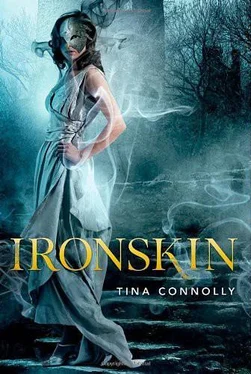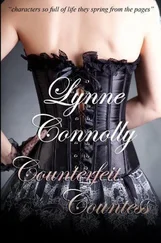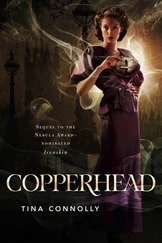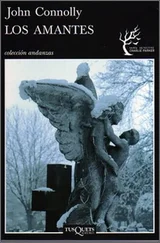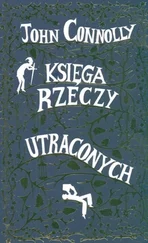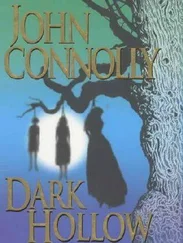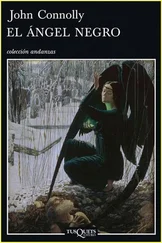Jane touched Helen’s arm. “I know you miss her.”
“And I’m sure you missed her in the city, after you left us,” said Helen, brightly, sharply, and Jane’s hand fell away. “But we’re not digging up unpleasant pasts today. Not for my wedding.” She dropped the decreamed cake sections to her saucer and smiled at Jane as if willing things to be all right. “Go on, eat, before I clean off this entire tray.” Helen’s fingers hovered over another slice. “But everyone says Silver Birch is enormous, one of those grand old fey-built estates. They probably have cream cakes out the ears. I suppose if he doesn’t chop you into bits, you can sneak me into some brilliant party there and we’ll make off with a bottle of sherry and an entire cake and go looking for all those slaughtered ex-wives.”
“I don’t think he has parties,” said Jane. “They live simply.” In truth she suspected that money was tight, but she didn’t like the idea of gossiping about her employer. To assuage Helen she picked up a small triangle of rose-scented cake and tried to turn the subject away from Helen’s gruesome imaginings. “Won’t there be lots of food today? Were there problems with rations?”
“Bosh,” said Helen, separating another cake slice. “The Great War is over, Jane, no matter what your country friends think. Rations simply don’t apply to someone like Alistair. Why do you think I picked him? Not just for his charm. People with money can save you, Jane—if they want to. But you take the bad with the good—you see how practical I have become, on my own—and today that means excess. He has the staff making mountains of cakes, chilling waterfalls of champagne. And really, it will be glorious, won’t it? But I can’t do this while people are watching.” She demonstrated what she couldn’t do by sucking pink cream filling from the sponge. “Anyway, that’s ages away. I still have an entire ceremony to get through without fainting, and so do you. Did you bring something nice to wear?”
“My best,” said Jane, referring to the navy frock with short sleeves. “You’ve seen it.”
Helen made a face. “You’ll wear something of mine.” She raised a cream-smeared finger, forestalling Jane’s protests. “You will. We’re the same size in everything but shoes. If you had a blond wig then from behind we’d look the same. Not even Alistair could tell us apart, I’m sure of it. You could take my place today, and wouldn’t that be a laugh? I wonder what he’d say when he found out.”
Jane’s protest subsided under this flight of fancy. Even knowing Helen’s sartorial tastes, the dress was a small battle, and the next point was a bigger one. “All right,” she said. “As long as I can wear my veil.”
* * *
The wedding was beautiful, the reception long. There were plenty of the little cream-filled cakes, but Jane didn’t see Helen eat anything at all. She moved through the party in her slim white frock like a ghost, her honey-hued hair in coiled curls contained by the pearl combs. “Fey beauty,” croaked an old auntie next to Jane, and then she was rewarded by hostile stares from the ladies around her. That was a saying from long ago. Not today.
Jane herself felt quite odd and otherworldly. Helen had insisted on fixing her veil so it was short and gauzy, not the long swathes of fabric Jane normally used. If Jane had had her normal veil she would have adjusted the layers to cover the front of her borrowed dress. Helen’s dressmakers had been busy providing her with a whole new wardrobe, and this was one of those dresses.
“But I can’t stand it,” Helen had said. “I don’t care how chic the color is, it washes me out. I wore it to Mrs. Wilmot’s tea party last week and her daughter Annabella just bumped right into me, in front of everyone. And then drawled, ‘Oh, I’m sorry I didn’t see you; you blended into the wallpaper.’ When their wallpaper is clearly pewter and not dark silver. Of course she’s just jealous because she wanted Alistair, not that that makes it any easier. Alistair assured me I was more beautiful than anyone except the Prime Minister’s wife. But I’m never wearing this again.”
The dress was a silvery grey silk, shot through with silver and jet threads that shimmered in the light. It very nearly matched her iron mask, though Jane could not decide if this was a good thing or not. The dress was in the very newest style—slinky and close-fitting, gathered at one hip and falling in a swish to the tops of Jane’s T-strap shoes. The décolletage was low—not as indecent as some of Helen’s dresses, but quite low enough for Jane. Helen had had to lend her a tight and low-cut slip that would work underneath.
The dress might have not worked well with Helen’s coloring, but it worked splendidly with Jane’s. Helen curled Jane’s dark brown hair with the tongs, then made her leave it down around her shoulders, tucking only the white fey-blighted lock up into the combs and veil. The dark silver transformed her pale, peaked look into something luminous, into a creature who was marble-skinned and elegant. It was the most beautiful dress Jane had ever worn, and she was very nearly in love with it, even if she felt an utter fraud.
As she came downstairs and found a seat outside under the erected tents, she noticed people looking at her. Relatives, servants—people who had seen her around the house all week suddenly stared at her as if for the first time. There was a brief moment where men looked at her as if she were a girl .
And then one by one they looked closer at her veiled face and remembered, or saw, the ironskin beneath. They discerned who she was, and they dismissed her.
But not all of them figured it out immediately. And not all of the men stopped looking at the silver lines of her dress.
Jane felt quite light-headed as she watched the wedding, struck by the idea that this might be how it was supposed to be. How even now she might wake up from her terrible dreams of the war and be happily sitting here whole and unveiled, watching her younger sister marry. Mother would be next to her, Charlie on the other side, the tall strong man she had never gotten to meet. Even in her imagination, the clock would not turn back far enough to put her father on the bench with them.
But it would turn back to that dreadful morning in the last month of the war. It would turn back to that dawn, and somehow she and Charlie were the lucky ones who made it home, who made it out of that war alive, until now they sit here on the bench as the minister recites Helen’s vows, and Charlie nudges her and whisper-recites the tale of Helen writing a love letter to their old clergyman in her ear, and they try not to giggle. For now Helen is saying the final words, and then it is all over, and Alistair is kissing the bride, and Mother clutches her hand, because she has promised Helen she will not cry.
They are done, they are smiling. And Jane turns to watch Alistair and Helen go solemnly down the aisle, and she should be looking over Charlie’s shoulder, her chin should be touching his arm.
But there was no Charlie, and her light-headedness popped, and then she was standing on her feet clapping with all the other men and women she didn’t know, who didn’t know her, who looked at her and looked away, again and again and again.
Jane sat down with a rush as the crowd swarmed after Helen and Alistair, cheering their names and congratulating them for this wonderful, glorious day.
* * *
There was dancing, but Jane deliberately found another room to sit in, where it wouldn’t look like she was wanting to dance and not able to find a partner. She ended up sitting next to the old woman who had called Helen fey earlier, and two other old women who loosened their shoes and watched the girls on display flit back and forth from the crammed ballroom to the room where the cakes and tidbits were laid out. A smaller dance with some of the youngsters was going on in this room, and an old man with a fiddle played for the kids and competed with the string quartet’s sound emanating from the larger dance floor.
Читать дальше
